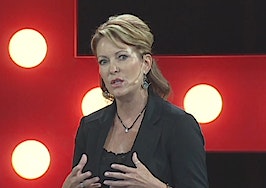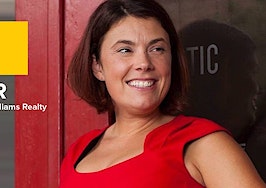- Start with top producers in new markets so they get up-to-speed and profitable quickly.
- Make sure your expansion team has succession planning for every leader.
- Average sales price matters -- teams with average sales prices below $250,0000 will find profitability difficult to reach.
- Have a very good communication system so the company culture is not diluted.
When Lisa Archer’s high school best friend from Birmingham, Alabama, mentioned she was thinking of getting her real estate license, the chief opportunity officer of the expansion team Live Love Homes immediately knew where the team was going next.
Her friend had worked in the mortgage industry; Archer knew she had the drive needed to succeed, and after the head of the local Keller Williams market center gave her friend the thumbs up, it was a done deal.
“It was a no-brainer,” said Archer, who could be described as your classic expansion team leader — driven and not requiring a lot of sleep.
Keller Williams as a franchisor has created opportunities for its associates through its expansion team program. In today’s Keller Williams Family Reunion “state of the company” speech, president John Davis said that the company experienced 18 percent growth in agent count in 2015. And Davis added that at least 20 “elite teams” joined Keller Williams in 2015 specifically because of its expansion team programs.
Lisa Archer’s expanded sales team

Lisa Archer
As the Live Love Homes COO, Archer is based at the company hub in Charlotte, North Carolina, but she has expanded her sales team to four other offices all over the country in the past couple of years.
Live Love Homes is currently located in Charlotte, Birmingham, Dallas and Syracuse, New York, and Archer will be re-launching with multiple agents in Emerald Coast, Florida, and Chicago this year.
Keller Williams is set up for these uber-teams spreading across the country — it has 158 of them in its Mega Agent Expansion program, and close to 600 of its agents are currently exploring expansion and have received training through the company’s Explorer Level membership.
Archer’s sales agents are set up in existing Keller Williams offices approved by the in-place market center leader.
Still experimenting
Expansion teams are still at the experimental stage, said Archer. “You don’t know what you don’t know — there are very few agents doing it. Some things work in some markets, and the same things don’t work in others.
“You have to ask yourself: ‘Are your agents going to want it as much as you do, are they going to work as hard as you would? Do they have the same value placed on leads or opportunities?’
[Tweet “Lisa Archer: ‘Are your agents going to want it as much as you do?'”]
And communication must be at the forefront of your thoughts. “There is a different communicative style when you have virtual agents in other markets,” Archer added.
She started lead generating in the Chicago market last April — and she currently has 3,000 leads in the database there. That was clearly too much for the single agent she had recruited for the Chicago market.
“What does one person do with 3,000 people?” she asked.
In a few months, Chicago will be relaunched in a big way, with solid back- and front-end support.
“We will not relaunch there without three or four agents,” said Archer.
Tech helps with logistics
Logistics can be a challenge for expansion team leaders. Archer can’t leap in the car and visit every office easily — so she hits the phone and uses tech systems to stay in touch with further-afield team members, thanks to products from dotloop, Brivity and Curaytor.
Make sure your tech is scalable, is her message.
Live Love Homes agents are a type. “We are very prospecting-heavy. While we get a lot of referrals — we are about high-prospecting agents,” said Archer.
“In interviews, we ask where their last 10 closings come from. If nine were referrals and one was from their sphere — in other words, they did not have to work for it — we know that they will not work in our system.
“I’ve got a lot of moms — we attract what we are,” she added.
Her director of operations warns new team members what it will be like working with Archer: “Lisa does not sleep. If she sends you a message after nine p.m., she does not need you to respond, she just needs to get it out of her head,” she tells them, according to Archer.
Meanwhile, there is no end in sight. The COO doesn’t rule out going international at some point.
“We don’t have an end as long as the right people come along,” she said.
KW’s top expansion leader? Seth Campbell

Seth Campbell
Keller Williams’ top expansion team leader is Seth Campbell, chairman of Five Doors Real Estate Team and the regional director for Maryland/Washington, D.C.
As co-owner of the highest production and largest expansion team in the world at Keller Williams, he also coaches others. To date, he is in 13 locations, from Anchorage to Cape Cod, producing 806 units, $221 million in volume, and $6.3 million gross commission income (GCI) last year.
He is also in Gary Keller’s private expansion group, which meets monthly.
Campbell reckons he has gotten three of his last new team expansion locations right, but he wants to try a few more places before he is thoroughly convinced.
He could write a book on his failures, he said.
“We have still not necessarily found the Holy Grail of the expansion team model,” said the KW Mastery coach.
“We just started our third year and turned profitable in year two last year. We might be onto it.”
Winning formula a matter of time
It is only a matter of time, though, as far as he is concerned. Expansion teams represent the natural expansion of a business, after all.
“A business wants to grow — at some point, you reach the sweet spot of profitability in a market, which will take you so far until you hit a critical mass and become less profitable,” he explained. “So you move to a new location. It’s why any business expands. Expansion is not new, it’s not even new to real estate, it’s just new to real estate teams.”
[Tweet “Seth Campbell: ‘Expansion is not new, it’s not even new to real estate, it’s just new to real estate teams.'”]
Campbell has worked hard on systemizing his successes.
“We have centralized administration, lead generation is centralized and we’ve centralized operations with training resources and accounting — we had to bring that in, too,” he said.
Why use a franchisor at all?
Does it beg the question, what does Campbell need Keller Williams for?
Campbell dismisses that. “Team expansion makes sense inside a brokerage — it’s a win win — you get to leverage the brick and mortar, the errors and omissions insurance, and so on.”
Compared with setting up your own brokerage, there is a tremendous cost savings, he said.
“In return, Keller Williams gets good-producing agents in their market, they have leads given to them, we don’t take up much of a footprint in the office — we don’t need to put admin in there, and they get income.”
Some other brokerages mention that local offices don’t necessarily like expansion teams coming to town, but this is not a problem at Keller Williams, said Campbell, where market center owners are well-versed in how expansion teams work.
“I must get two or three emails a week requesting me to please put some of my team there,” said Campbell.
Compensation patterns
On the compensation side, expansion teams work the same way as a regular team, he said. So the typical split patterns are 50 percent agent/50 percent team on the buy side, and for listing agents, 25 percent to 30 percent to the agent/70 percent to 75 percent to the team. Some do split differentiation based on the lead source.
A tip from Campbell: Average sales price matters. “You will find that below $300,000, it is difficult, and below $250,0000, is really difficult — it only works if someone already well-established is doing lots of units.”
More tips: make sure there is a succession plan for all key members of the team and have a seamless communication system, which helps maintain the company culture. Five Doors has used GroupMe for group texts, and Campbell is currently looking at Slack for online communication.
Start at the top
One of the biggest lessons Campbell has learned is to expand starting with high performers.
“What we are doing is finding a proven higher-producing local partner and giving them regional rights to open Five Doors locations, then doing a profit split with them,” he explained.
“Every time we put newer or lower-producing agents in, it’s taken us nine months to get profitable,” he said. But a high-producing team can get to profitability in two months.
It’s all about the “who” in a new location, he said.
“Each time we partnered with a proven producer who also has at least two key hires already in their business, we can scale their business quickly and put them in a place where they never have to hire or train administrative staff again,” he explained. “This gives them time to open new locations profitably much faster and have a new large income stream from being a Regional Partner.”
[Tweet “Seth Campbell: We can put businesses in a place where they never have to hire or train administrative staff again.”]
Matt Fetick is going international

Matt Fetick
Campbell said he would go international if the right opportunity and person appeared.
He will be following a few intrepid types. Fellow KW agents Matt Fetick and Ben Kinney, while running their fast-growing expansion teams in the U.S., have set up a new KW market center in London in the past year.
Fetick currently has an admin hub in Kennett Square, Pennsylvania, and Matt Fetick Alliance sales teams in Kennett Square and Rehoboth Beach, Delaware. He owns a Keller Williams market center in Rehoboth and London, England, and is planning the launch of the Keller Williams Ocean City market center in Maryland.
Why England? “I had a U.S.-based team leader who wanted a new opportunity,” said Fetick. “He was looking to do something different, a brand new culture, brand new everything. I was keen to get across to Europe.
“For Ben and I, it was a chance to get into business together, partnering overseas, doing our own thing — it seemed like a great opportunity,” he added.
The London foray has meant two different types of expansion — one in ownership, the other in sales.
The overseas difference
“As owner of the London office, you have to think about agent recruiting and development,” said Fetick. “It’s all about creating a brokerage that will help our agents build significant businesses. With a sales expansion partner there, you have to think about creating transactions through cross-referral relationships and how to generate leads in that market. It’s fantastic — there are two totally different mindsets involved.”
Having international links can come in handy. Fetick’s team is about to represent a large U.S. national builder to market his developments internationally in London, Manchester and Shanghai, thanks to talking about his experiences in the UK.
They have just hired a Brit to be the new manager, and as he learns the KW systems, he will start to take over.
Fetick is frank about exactly how difficult the past year has been: “It’s been the toughest learning I have ever had,” he said.
“We’ve been in an exploratory phase for a year — in August 2015 we opened the market center, so we are five months in.”
It was the second KW office in the UK — the first created just six months prior, in Leeds.
“We are really at the beginning, the pioneers of it all. It’s hard. It’s different, there are so many things that are different,” said Fetick.
Keeping focused Stateside
Meanwhile in the U.S., Fetick’s goal in the next 10 years is to have up to 300 expansion agent partners within a two-hour drive of his hub. This would take in New Jersey, Maryland, Virginia, North Virginia, and potentially an outlier market of South Florida, where real estate laws are similar to Pennsylvania’s.
Fetick is currently interviewing for the role of regional director to work with him to locate people, train them and support these agents in their markets.
There will eventually be 10 regional directors supporting 30 agents operating in KW offices in each region — 300 agents total on the team.
[Tweet “Matt Fetick: ‘The success of the business is always tied to people.'”]
“The success of the business is always tied to people,” Fetick said.
You can have all the “grandiose visions” in the world, but until you get the people, you’ve got nothing, he warns.
Laurel Starks on ‘niche expansion’

Laurel Starks
Unlike Fetick, for now, Southern California expansion team leader Laurel Starks, author of “Divorcing the House,” is content with staying in her region but wants to spread the word about her area of specialty.
Starks, who is coached by Seth Campbell, said: “I am a niche expansion. We specialize in divorce real estate, so my business is grown by cultivating relationships and respect within the family law community throughout SoCal.”
Servicing the family law communities throughout all of Southern California, from Santa Barbara down to San Diego, is her ultimate goal.
“In order to reach those perimeters, we are oozing into the neighboring communities of our hub in Rancho Cucamonga and growing out from there,” she said.
Maximize opportunity at home first
“We are fortunate to have density and favorable price point here in SoCal, so I don’t see a need to go beyond our area,” Starks explained. “Branching out to other states or MLSs presents complications and expense. When we have some of the highest volume and highest price points right under our nose, we will maximize our opportunity here first.”
Starks has looked at another Keller Williams’ agent’s model for expanding a niche business like hers.
“My business is unique in that it’s a hyper-focused niche model, with a traditional component folded in,” she explained.
“My friend and mega agent Lance Loken, the number one KW agent in Houston, has a niche-builder business with a traditional business in tandem — and that is the most similar proven model that inspires my divorce real estate model. Lance has been instrumental in helping me write my organizational chart and business plan.”
The qualities that make a team lead
Not everyone is a natural expansion team leader, said Starks. “You have to have growth-minded, forward-thinking leadership qualities,” she said. And real estate skills do not always translate to leadership or business-owner skills.
“An effective expansionist is a perpetual student of business and leadership, driven by results,” she said.
The SoCal agent sees one of her primary roles as training and developing her team members to become divorce real estate experts.
[Tweet “Laurel Starks: ‘Having a comprehensive training program allows my niche to scale through others.'”]
“Having a comprehensive training program allows my niche to scale through others,” she said.
Scalable expansion via training
Starks is in the process of developing a teaching and training business, the Divorce Real Estate Institute, which will educate other agents outside of her team’s coverage area about the niche.
“The DREI is, essentially, my ‘national’ expansion plan — albeit not the real estate sales model approach,” she said.





